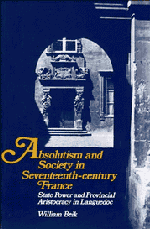 Absolutism and Society in Seventeenth-Century France
Absolutism and Society in Seventeenth-Century France Book contents
- Frontmatter
- Contents
- List of tables
- List of figures
- Preface
- List of abbreviations
- Map: Languedoc in the seventeenth century
- PART ONE INTRODUCTION
- 1 Absolutism and class
- 2 Languedoc and its rulers
- PART TWO THE DISTRIBUTION OF AUTHORITY
- PART THREE THE PROVINCE ON ITS OWN
- PART FOUR THE PROVINCE AND THE CROWN
- Conclusion
- Appendix: Breakdown of taxes from the diocese of Toulouse, 1677
- Select bibliography
- Index
- Frontmatter
- Contents
- List of tables
- List of figures
- Preface
- List of abbreviations
- Map: Languedoc in the seventeenth century
- PART ONE INTRODUCTION
- 1 Absolutism and class
- 2 Languedoc and its rulers
- PART TWO THE DISTRIBUTION OF AUTHORITY
- PART THREE THE PROVINCE ON ITS OWN
- PART FOUR THE PROVINCE AND THE CROWN
- Conclusion
- Appendix: Breakdown of taxes from the diocese of Toulouse, 1677
- Select bibliography
- Index
Summary
This is a study of the exercise of power in one French province under absolutism. Two questions need answering. The first concerns Louis XIV's dramatic success in ruling France more effectively than his immediate predecessors. In the days when historians regarded the Fronde as a frivolous detour in the inexorable progress of royal power, it was possible to see the Sun King's effectiveness as simply an act of will – a crackdown or ‘restoration of order’. But now that there is general agreement on the depth and seriousness of the social discontent which filled the period 1610 to 1661 with noble revolts, popular insurrections, and sporadic civil wars, it is much harder to see how the situation could have been righted by the initial actions of a twenty-three-year-old monarch.
All the textbooks report that Louis XIV subjugated the aristocracy by luring them to Versailles and tantalizing them with status shorn of power, while transferring their authority to bureaucratic agents. But could such deep-seated dissatisfaction really have turned so rapidly to placid indifference? And what about all the aristocrats out in the provinces? It almost seems as if a cast of turbulent frondeurs was swept from the stage around 1661 and replaced with a company of obsequious courtiers, yet the courtiers and the frondeurs were the same individuals.
- Type
- Chapter
- Information
- Absolutism and Society in Seventeenth-Century FranceState Power and Provincial Aristocracy in Languedoc, pp. 3 - 33Publisher: Cambridge University PressPrint publication year: 1985
- 2
- Cited by
